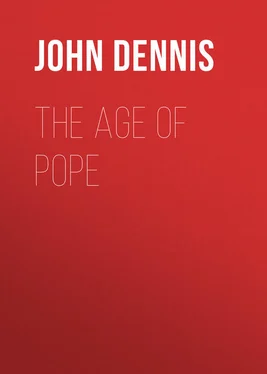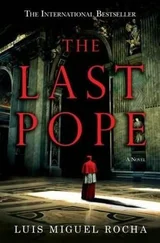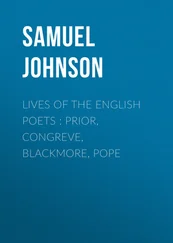John Dennis - The Age of Pope
Здесь есть возможность читать онлайн «John Dennis - The Age of Pope» — ознакомительный отрывок электронной книги совершенно бесплатно, а после прочтения отрывка купить полную версию. В некоторых случаях можно слушать аудио, скачать через торрент в формате fb2 и присутствует краткое содержание. Жанр: foreign_antique, foreign_prose, на английском языке. Описание произведения, (предисловие) а так же отзывы посетителей доступны на портале библиотеки ЛибКат.
- Название:The Age of Pope
- Автор:
- Жанр:
- Год:неизвестен
- ISBN:нет данных
- Рейтинг книги:3 / 5. Голосов: 1
-
Избранное:Добавить в избранное
- Отзывы:
-
Ваша оценка:
- 60
- 1
- 2
- 3
- 4
- 5
The Age of Pope: краткое содержание, описание и аннотация
Предлагаем к чтению аннотацию, описание, краткое содержание или предисловие (зависит от того, что написал сам автор книги «The Age of Pope»). Если вы не нашли необходимую информацию о книге — напишите в комментариях, мы постараемся отыскать её.
The Age of Pope — читать онлайн ознакомительный отрывок
Ниже представлен текст книги, разбитый по страницам. Система сохранения места последней прочитанной страницы, позволяет с удобством читать онлайн бесплатно книгу «The Age of Pope», без необходимости каждый раз заново искать на чём Вы остановились. Поставьте закладку, и сможете в любой момент перейти на страницу, на которой закончили чтение.
Интервал:
Закладка:
One of the most powerful exponents of the dark side of the century is Hogarth, who makes some of its worst features live before our eyes. So also do the novels of Richardson, Fielding, and Smollett. Differing as their works do in character, they have the common merit of presenting in indelible lines a picture of the time in its social aspects. It may have been, as Stuart Mill asserts, an age of strong men, but it was an age of coarse vices, an age wanting in the refinements and graces of life; an age of cruel punishments, cruel sports, and of a political corruption extending through all the departments of the State.
But it would be a narrow view of the age to dwell wholly on its gloomier features, which are always the easiest to detect. If the period under consideration had prominent vices, it had also distinguished merits. Under Queen Anne and her immediate successors, home-keeping Englishmen had more space to breathe in than they have now, and trade was not demoralized by excessive competition. No attempt was made to separate class from class, and population was not large enough to make the battle of life almost hopeless in the lowest section of the community. If there was less refinement than among ourselves, there was far less of nervous susceptibility, and the country was free from the half-educated class of men and women who know enough to make them dissatisfied, without attaining to the larger knowledge which yields wisdom and content. To say that the age was better than our own would be to deny a thousand signs of material and intellectual progress, but it had fewer dangers to contend with, and if there was far less of wealth in the country the people were probably more satisfied with their lot. 10 10 According to Hallam the thirty years which followed the Treaty of Utrecht 'was the most prosperous season that England had ever experienced.' — Const. Hist. ii. 464.
To glance at the century as a whole does not fall within my province, but I may be permitted to observe that in the course of it science and invention made rapid strides; that under the inspiring sway of Handel the power of music was felt as it was never felt before; that in the latter half of the period the Novel, destined to be one of the noblest fruits of our imaginative literature, attained a robust life in the hands of Richardson, Fielding, and Smollett; and that, with Reynolds and Gainsborough, with Romney and Wilson, a glorious school of landscape and portrait painters arose, which is still the pride of England. It will be remembered, too, that many of the great charitable institutions which make our own age illustrious, had their birth in the last. The military genius of England was displayed in Marlborough and in Clive, her mercy in John Howard, her spirit of enterprise in Cook, her self-sacrifice in Wesley and Whitefield, her statesmanship in Walpole, in Chatham, and in William Pitt. In oratory as everyone knows, the eighteenth century was surpassingly great, and never before or since has the country produced a political philosopher of the calibre of Burke. What England reaped in literature during the period of which Pope has been selected as the most striking figure, it will be my endeavour to show in the course of these pages.
PART I.
THE POETS
CHAPTER I.
ALEXANDER POPE
It is not unreasonable to call the period we are considering 'the Age of Pope.' He is the representative poet of his century. Its literary merits and defects are alike conspicuous in his verse, and he stands immeasurably above the numerous versifiers who may be said to belong to his school. Savage Landor has observed that there is no such thing as a school of poetry, and this is true in the sense that the essence of this divine art cannot be transmitted, but the form of the art may be, and Pope's style of workmanship made it readily imitable by accomplished craftsmen. Although he affected to call poetry an idle trade he devoted his whole life to its pursuit, and there are few instances in literature in which genius and unwearied labour have been so successfully united. It is to Pope's credit, that, with everything against him in the race of life, he attained the goal for which he started in his youth. The means he employed to reach it were frequently perverse and discreditable, but the courage with which he overcame the obstacles in his path commands our admiration.
Alexander Pope (1688-1744).
Alexander Pope was born in London on May 21st, 1688. He was the only son of his father, a merchant or tradesman, and a Roman Catholic at a time when the members of that church were proscribed by law. The boy was a cripple from his birth, and suffered from great bodily weakness both in youth and manhood. Looking back upon his life in after years he called it a 'long disease.' The elder Pope seems to have retired from business soon after his son's birth, and at Binfield, nine miles from Windsor, twenty-seven years of the poet's life were spent. As a 'papist' Pope was excluded from the Universities and from every public career, but even under happier circumstances his health would have condemned him to a secluded life. He gained some instruction from the family priest, and also went for a short time to school, but for the most part he was self-educated, and studied so severely that at seventeen his life was probably saved by the sound advice of Dr. Radcliffe to read less and to ride on horseback every day. The rhyming faculty was very early developed, and to use his own phrase he 'lisped in numbers.' As a boy he felt the magic of Spenser, whose enchanting sweetness and boundless wealth of imagination have been now for three hundred years a joy to every lover of poetry. Something, too, he learned from Waller and from Sandys, both of whom, but especially the former, had been of service in giving smoothness to the iambic distich, in which all of Pope's best poems are written. Dryden, however, whom when a little boy he saw at Will's coffee-house – ' Virgilium tantum vidi ' records the memorable day – was the poet whose influence he felt most powerfully. Like Gray several years later, he declared that he learnt versification wholly from his works. From 'knowing Walsh,' the best critic in the nation in Dryden's opinion, the youthful Pope received much friendly counsel; and he had another wise friend in Sir William Trumbull, formerly Secretary of State, who recognized his genius, and gave him as warm a friendship as an old man can offer to a young one. The dissolute Restoration dramatist, Wycherley, was also his temporary companion. The old man, if Pope's story be true, asked him to correct his poems, which are indeed beyond correction, as the youthful critic appears to have hinted, and the two parted company.
The Pastorals , written, according to Pope's assertion, at the age of sixteen, were published in 1709, and won an amount of praise incomprehensible in the present day. Mr. Leslie Stephen has happily appraised their value in calling them 'mere school-boy exercises.' Not thus, however, were they regarded by the poet, or by the critics of his age, yet neither he nor they could have divined the rapid progress of his fame, and that in about six years' time he would be regarded as the greatest of living poets. The Essay on Criticism , written, it appears, in 1709, was published two years later, and received the highest honour a poem could then have. It was praised by Addison in the Spectator as 'a very fine poem,' and 'a masterpiece in its kind.' The 'kind,' suggested by the Ars Poetica of Horace, and the Art Poétique of Boileau – translated with Dryden's help by Sir William Soame – suited the current taste for criticism and argument in rhyme, which had led Roscommon to write an Essay on Translated Verse , and Sheffield an Essay on Poetry . The Essay on Criticism is a marvellous production for a young man who had scarcely passed his maturity when it was published. To have written lines and couplets that live still in the language and are on everyone's lips is an achievement of which any poet might be proud, and there are at least twenty such lines or couplets in the poem.
Читать дальшеИнтервал:
Закладка:
Похожие книги на «The Age of Pope»
Представляем Вашему вниманию похожие книги на «The Age of Pope» списком для выбора. Мы отобрали схожую по названию и смыслу литературу в надежде предоставить читателям больше вариантов отыскать новые, интересные, ещё непрочитанные произведения.
Обсуждение, отзывы о книге «The Age of Pope» и просто собственные мнения читателей. Оставьте ваши комментарии, напишите, что Вы думаете о произведении, его смысле или главных героях. Укажите что конкретно понравилось, а что нет, и почему Вы так считаете.












